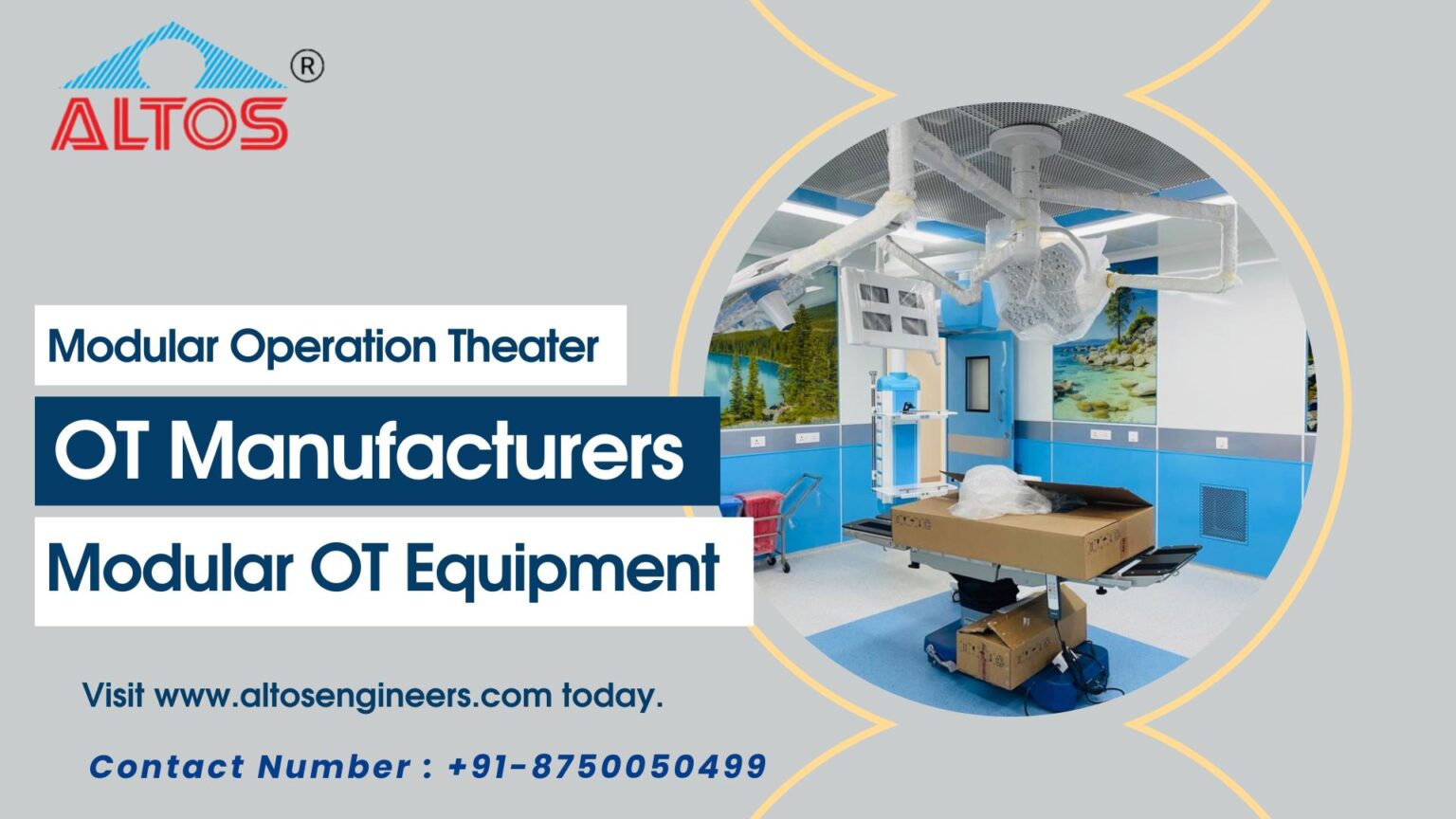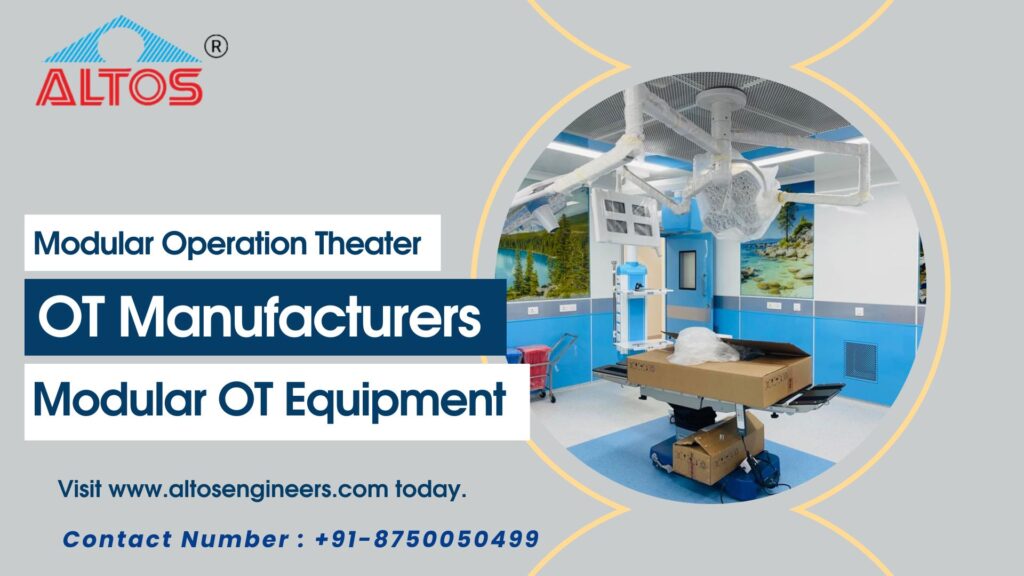Modular Operation Theatre | Advantages & Disadvantages of OT

Medical Equipments
Medical equipment refers to the tools and devices that are used in medical procedures to diagnose, treat, and monitor patients. Medical equipment can range from small handheld devices to large complex machines, and they play a critical role in modern healthcare.
Some common types of medical equipment include:
Diagnostic equipment: This includes devices like X-ray machines, ultrasound machines, CT scanners, MRI machines, and other imaging equipment that are used to diagnose medical conditions.
Monitoring equipment: This includes devices like EKG machines, blood pressure monitors, pulse oximeters, and other devices that are used to monitor a patient’s vital signs and other health indicators.
Life support equipment: This includes devices like ventilators, dialysis machines, and other equipment that are used to support patients who are critically ill or have organ failure.
Anesthesia equipment: This includes equipment like anesthesia machines, vaporizers, and monitors that are used to administer and monitor anesthesia during surgical procedures.
Surgical Instruments: These are instruments that are used during surgical procedures, such as scalpels, forceps, scissors, clamps, retractors, etc. Surgical instruments.
Mobility aids: These include devices such as wheelchairs, crutches, and walkers that help patients with mobility problems move around.
Home care equipment: This includes equipment such as home oxygen machines, nebulizers, and other equipment that patients use to manage their medical conditions at home.
Proper maintenance and sterilization of medical equipment is critical to ensure patient safety and prevent the spread of infections.

Lorem ipsum dolor sit amet, consectetur adipiscing elit. Ut elit tellus, luctus nec ullamcorper mattis, pulvinar dapibus leo.
Medical Equipment and Surgicals
Medical instruments and surgical instruments are tools and equipment used in medical procedures to diagnose, treat, and monitor patients. They are essential components of modern healthcare, and are of various types.
Some common types of medical equipment and surgicals include:
Diagnostic Equipment: This includes equipment such as X-ray machines, ultrasound machines, CT scanners, MRI machines, and other imaging equipment that are used to diagnose medical conditions.
Surgical instruments: These are instruments that are used during surgical procedures, such as scalpels, forceps, scissors, clamps, retractors, and other surgical instruments.
Monitoring equipment: This includes equipment such as EKG machines, blood pressure monitors, pulse oximeters, and other devices that are used to monitor a patient’s vital signs and other health indicators.
Life support equipment: This includes equipment such as ventilators, dialysis machines, and other equipment that are used to assist patients who are critically ill or have organ failure.
Anesthesia Equipment: This includes equipment such as anesthesia machines, vaporizers, and monitors that are used to administer and monitor anesthesia during surgical procedures.
Medical Consumables: These are disposable items such as gloves, syringes, needles, surgical masks, gowns and other items used in medical procedures.
All medical and surgical instruments are properly maintained to ensure patient safety and prevent the spread of infection.
Operation Theatres
An operating theatre, also known as an operating room, is a specially designed room in a hospital or medical facility where surgical procedures are performed. The operating theater is a sterile environment designed to reduce the risk of infection and ensure patient safety during surgical procedures.
The operating theatre typically has a number of specialized features, including:
Sterilization equipment: The operating theater is equipped with special equipment for sterilizing surgical instruments, such as autoclaves and sterilization trays, etc.
Surgical lighting: The operating theater has bright, adjustable lighting that provides good visibility during surgical procedures to ensure smooth operation.
Anesthesia equipment: Operating theaters are equipped with anesthesia machines, vaporizers, and monitors, which are used to administer and monitor anesthesia during surgical procedures.
Surgical Instruments: A wide range of surgical instruments are available in the operation theater including scalpels, forceps, scissors, clamps and other surgical instruments.
Operating Table: The operating table is designed to be adjustable and positioned to allow the surgeon and other medical staff to access the surgical site from different angles.
Communication systems: Operating theaters have communication systems that allow the surgical team to communicate with each other and with other areas of the hospital.
Emergency equipment: The operating theater is equipped with emergency equipment, such as defibrillators, oxygen tanks, and other equipment used in medical emergencies.
Modular Operating Theatres
A modular operating theatre is a type of operating room that is constructed using modular components. Unlike traditional operating rooms, which are built on-site and require extensive construction work, modular operating theatres are pre-fabricated off-site and assembled on-site.
Modular operating theatres have a number of advantages over traditional operating rooms, including:
Flexibility: Modular operating theatres can be easily customized to meet the specific needs of a hospital or medical facility. They can be designed to accommodate different types of surgical procedures and can be easily expanded or reconfigured as needed.
Speed of construction: Modular operating theatres can be constructed much more quickly than traditional operating rooms. Because they are pre-fabricated off-site, they can be assembled on-site in a matter of weeks, rather than months.
Reduced disruption: Because modular operating theatres are constructed off-site, there is much less disruption to hospital operations during construction. This can help to minimize downtime and reduce the risk of infection.
Improved infection control: Modular operating theatres are designed to be highly sterile environments, with specialized air filtration systems and other features that help to reduce the risk of infection.
Enhanced safety: Modular operating theatres are designed to meet the highest safety standards, with features like fire-resistant construction materials and integrated medical gas systems.
Modular operating theatres offer a cost-effective and efficient solution for hospitals and medical facilities looking to expand or upgrade their surgical capabilities.
Conventional Operation Theatres
A conventional operating theatre is a traditional type of operating room that is built on-site using traditional construction methods. These operating rooms are typically constructed as part of a hospital or medical facility and are designed to meet specific requirements for surgical procedures.
Conventional operating theatres have a number of features, including:
Sterilization equipment: Conventional operating theatres are equipped with specialized equipment for sterilizing surgical instruments, such as autoclaves and sterilization trays.
Air filtration systems: Conventional operating theatres have specialized air filtration systems that help to maintain a sterile environment by filtering out airborne bacteria and other contaminants.
Surgical lighting: The operating theatre has bright, adjustable lighting that provides good visibility during surgical procedures.
Anesthesia equipment: Conventional operating theatres are equipped with anesthesia machines, vaporizers, and monitors that are used to administer and monitor anesthesia during surgical procedures.
Surgical instruments: Conventional operating theatres have a wide range of surgical instruments available, including scalpels, forceps, scissors, clamps, and other surgical instruments.
Operating table: The operating table is designed to be adjustable and can be positioned to allow the surgeon and other medical staff to access the surgical site from different angles.
Communication systems: Conventional operating theatres have communication systems that allow the surgical team to communicate with each other and with other areas of the hospital.
Emergency equipment: The operating theatre is equipped with emergency equipment, such as defibrillators, oxygen tanks, and other devices that can be used in case of a medical emergency.
Conventional operating theatres are still widely used in hospitals and medical facilities around the world, as they provide a reliable and effective solution for surgical procedures. However, modular operating theatres are becoming increasingly popular due to their flexibility, speed of construction, and other advantages.
Advantages and Disadvantages of Modular OT
Modular operation theatres have several advantages and disadvantages compared to conventional operating theatres. Here are some of the most significant advantages and disadvantages of modular operating theatres:
Modular operation theatre Advantages:
Flexibility: Modular operating theatres can be customized according to the specific needs of a hospital or medical facility. They can be designed to accommodate different types of surgical procedures and can be easily expanded or reconfigured as needed.
Speed of construction: Modular operating theatres can be constructed much more quickly than traditional operating rooms. Because they are pre-fabricated off-site, they can be assembled on-site in a matter of weeks, rather than months.
Reduced disruption: Because modular operating theatres are constructed off-site, there is much less disruption to hospital operations during construction. This can help to minimize downtime and reduce the risk of infection.
Improved infection control: Modular operating theatres are designed to be highly sterile environments, with specialized air filtration systems and other features that help to reduce the risk of infection.
Enhanced safety: Modular operating theatres are designed to meet the highest safety standards, with features like fire-resistant construction materials and integrated medical gas systems.
Modular operation theatre Disadvantages:
Limited customization: While modular operating theatres can be customized to some extent, there may be limitations on the types of modifications that can be made, particularly if the modules have already been fabricated.
Higher cost: Modular operating theatres can be more expensive than conventional operating theatres, particularly if specialized customization is required.
Dependence on suppliers: Modular operating theatres are dependent on suppliers for the fabrication and delivery of the modules. Any delays or issues with the supplier can cause delays in the construction and installation of the operating theatre.
Limited portability: Modular operating theatres are generally designed to be installed in a permanent location and may not be easily moved to a different location if needed.
Modular operating theatres offer a cost-effective and efficient solution for hospitals and medical facilities looking to expand or upgrade their surgical capabilities, but they may not be suitable for all situations. The decision to use a modular operating theatre should be based on a careful consideration of the advantages and disadvantages, as well as the specific needs of the hospital or medical facility.
What are the advantages and disadvantages of having a modular operation theater (OT) in a hospital in India?
Advantages of having modular operation theatre (OT) in a hospital in India:
Flexibility: Modular OTs can be customized to meet the specific needs of the hospital or medical facility. They can be designed to accommodate different types of surgical procedures and can be easily expanded or reconfigured as needed.
Speed of construction: Modular OTs can be constructed much more quickly than traditional operating rooms. Because they are pre-fabricated off-site, they can be assembled on-site in a matter of weeks, rather than months, which can save time and reduce disruption to hospital operations.
Improved infection control: Modular OTs are designed to be highly sterile environments, with specialized air filtration systems and other features that help to reduce the risk of infection. This is particularly important in India, where infection control can be a major challenge in healthcare settings.
Enhanced safety: Modular OTs are designed to meet the highest safety standards, with features like fire-resistant construction materials and integrated medical gas systems.
Cost-effective: Modular OTs can be a cost-effective solution for hospitals and medical facilities looking to expand or upgrade their surgical capabilities, as they can be constructed more quickly and at a lower cost than traditional operating rooms.
Disadvantages of having modular operation theatre (OT) in a hospital in India:
Limited customization: While modular OTs can be customized to some extent, there may be limitations on the types of modifications that can be made, particularly if the modules have already been fabricated.
Dependence on suppliers: Modular OTs are dependent on suppliers for the fabrication and delivery of the modules. Any delays or issues with the supplier can cause delays in the construction and installation of the operating theatre.
Higher initial cost: While modular OTs can be cost-effective in the long run, the initial cost of setting up a modular OT can be higher than that of a traditional operating room.
Limited portability: Modular OTs are generally designed to be installed in a permanent location and may not be easily moved to a different location if needed.
The advantages of having a modular operating theatre in a hospital in India can outweigh the disadvantages, particularly when it comes to improving infection control, enhancing safety, and providing a cost-effective solution for expanding or upgrading surgical capabilities. However, the decision to use a modular operating theatre should be based on a careful consideration of the specific needs of the hospital or medical facility.
Control Panel Mumbai, Ivf Lab Manufacturer, Modular Operation Theatre Manufacturer Gujarat, Ivf Lab Manufacturer Indore Mp, Hygienic Air Handling Units In MP, Operation Theater Classified Door In Mumbai, Modular Operation Theatre Manufacturer Mumbai, SS modular operation theatre in Mumbai, SS modular operation theatre in India, Modular operation theater manufacturer in Kalyan, ivf lab manufacturer in India, Mobile operation theatre manufacture in india, Mobile operation theatre manufacture in Mumbai, Modular mobile operation theatre, IVF Lab setup with laminar air flows system, IVF Lab setup cost in india, IVF manufacturer in Mumbai, IVF operation theatre setup, Modular IVF lab setup in india, IVF lab setup cost, IVF lab design, Modular operation theatre manufacturer in india, Non modular operation theatre india, Non modular operation theatre Mumbai, Non modular operation theatre pune, Non modular operation theatre Gujarat, NABH guidelines for modular operation theatre, Modular operation theatre cost, Modular operation theatre cost in india, Modular operation theatre with laminar , Modular operation theatre with laminar, Corian modular operation theatre, PVC sheet modular operation theatre, Corian operation theatre cost, AHU & Laminor for operation theatre, modular operation theatre, medical equipment, operation theatre light manufacturers, modular ot manufacturers in india, ot light, ot table manufacturers in india, modular operation theatre manufacturers in india, surgical items list, equipment used in operation theatre, hospital equipment, instruments used in operation theatre, medical equipments, medical equipment name, medical items, modular operation theater, modular operation theatre design, modular ot manufacturer, modular ot manufacturers in delhi, operation theater equipment, operation theater equipment list, operation theatre light, operation theatre light manufacturers, ot operation theatre, ot table hydraulic, modular ot, modular operation theater, modular operation theaters, modular operation theatre, modular operation theatres, modular and conventional ot, medical equipment, medical equipment and surgicals, operation theatre, modular operation theatre, conventional operation theatre, advantages and disadvantages of modular ot, advantages and disadvantages of conventional ot, advantages and disadvantages of conventional operation theatre, advantages of modular ot, advantages of conventional ot, disadvantages of modular ot, disadvantages of conventional ot, advantages of conventional operation theatre, disadvantages of modular operation theatre, advantages of conventional operation theatre, disadvantages of modular operation theatre,
